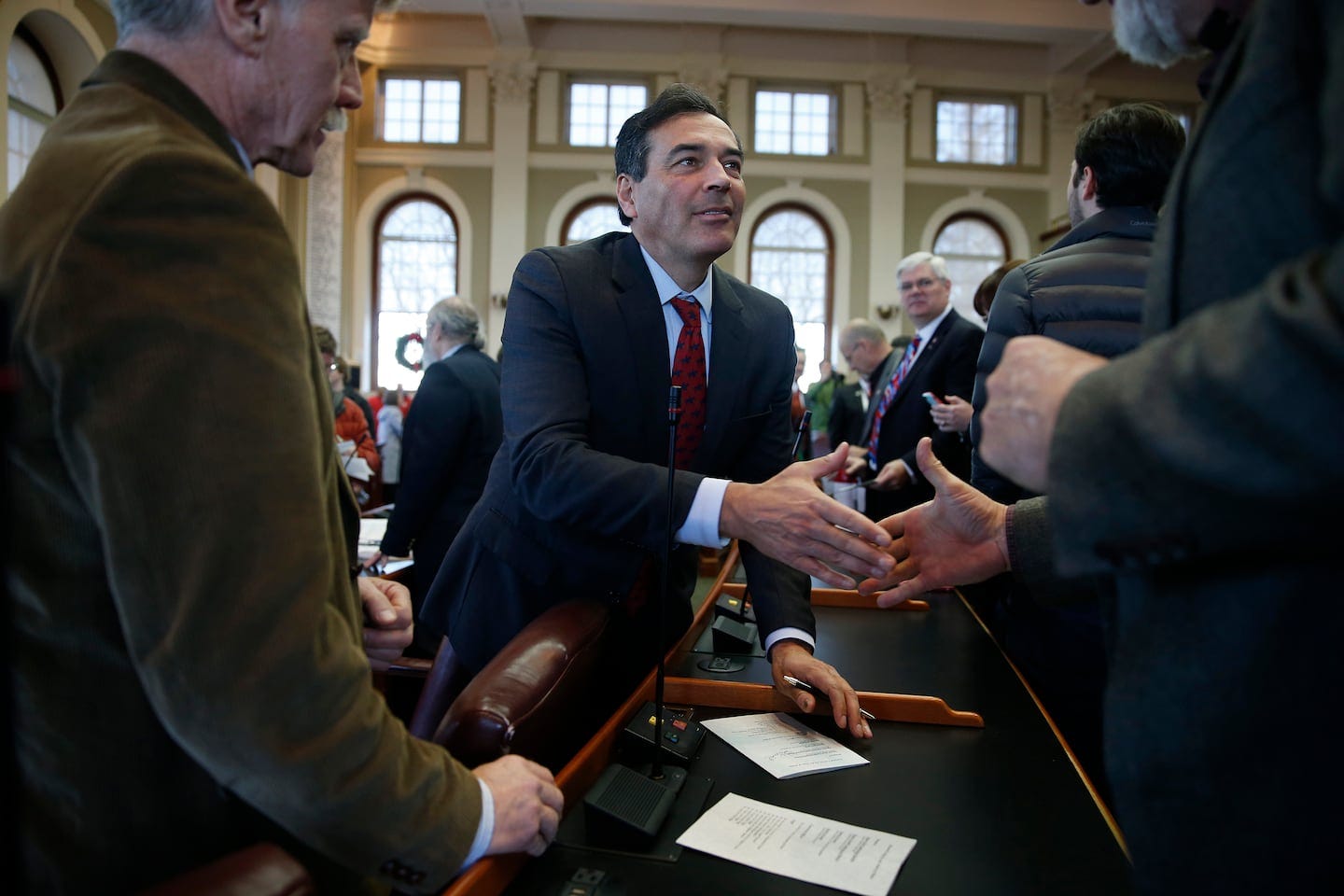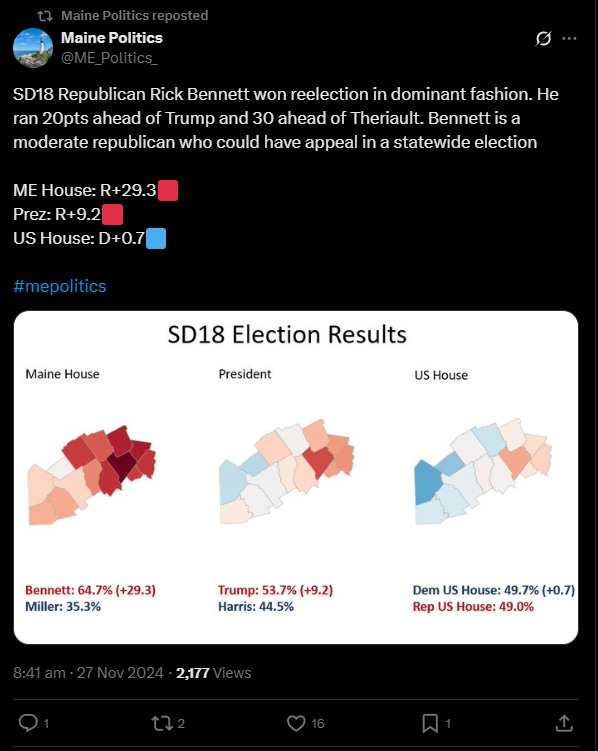What Rick Bennett's independent campaign for Maine Governor means
The ex-Republican State Senator has cut a moderate cloth in decades of public service.
Rick Bennett has long wanted higher office.
The State Senator from Norway, Oxford County, has run for Congress (in 1994, losing to John Baldacci for Olympia Snowe’s seat in one of only two Democratic house flips amidst the Republican Revolution1) and U.S. Senate (in 2012, finishing third in the primary behind nominee Charlie Summers and future congressman Bruce Poliquin), and has long been rumored to be interested in the Blaine House. Now, he’s finally trying for it — and he’s leaving his party to do so.
For his entire time in public service, Rick Bennett has been a steadfast and loyal Republican. First elected to the State House in 1990 at the tender age of 27, he was re-elected unopposed in 1992 and easily dispatched three opponents to win the GOP nomination for Snowe’s House seat in 1994.2 He returned to the state legislature in 1996, this time as a State Senator, and served until 2002, winning his last term unopposed.
He spent the second half of his last term as President of the Maine Senate as part of a power-sharing agreement with Senate Democrats, after the 2000 election resulted in a State Senate with an equal number of Democrats and Republicans.3 Bennett entered the private sector after leaving the State Senate, but remained active in GOP circles, and considered a campaign for governor in 2006 (he ultimately declined to run, serving as GOP nominee Chandler Woodcock’s campaign co-chairman). He was a member of the RNC from 2008 to 2012, and after his unsuccessful bid for Senate, he became chairman of the state Republican Party. He even cast an electoral college vote for Donald Trump after the 2016 election, as the GOP’s elector for Maine’s second congressional district.
He returned to elected politics in 2020, winning his old State Senate district and outrunning Donald Trump by about six points in the process. He was re-elected in 2022, outrunning Paul LePage by about 10 points in a redrawn district with new territory for him. He then put up a titanic performance in 2024, outrunning Trump by 20 points (and Republican congressional nominee Austin Theriault by even more).
Bennett is a certified electoral titan, which is why Democrats should be concerned that he’s leaving the GOP to mount his campaign for the Blaine House.
Bennett has always cut a moderate figure, but his return to the State Senate has seen him become the single most bipartisan state legislator in Maine, according to analysis done by the impeccable @ME_Politics_ account on The Social Media Platform Formerly Known As Twitter.
Bennett was a supporter of the referendum to have the state take over the electricity monopoly in Maine, has been an advocate for tribal sovereignty (putting him at odds with Maine’s Democratic governor), has been an advocate for campaign finance reform, for ranked-choice voting (despite initially opposing it), and he joined with Democrats to pass a bill disallowing local police from carrying out federal immigration enforcement and restricting local police’s ability to work with ICE.
Perhaps most notably, however, is his stance on LGBTQ rights. As the existence of trans kids has inflamed Maine Republicans in 2025, Bennett became the only Senate Republican to join Senate Democrats in voting down bills prohibiting trans girls from participating in sports and requiring public school students to use the bathrooms that aligned with their birth sex.
Bennett is the last gasp of the traditional moderate Maine Republican. It makes sense that he’d rather avoid a GOP primary campaign. I’m sure he’d say that the party left him. He’s what Susan Collins claims to be.
Rick Bennett is the strongest independent candidate to run for Governor of Maine since 2014. That’s not really saying much — there’s only been two elections since then, and 2022 was the first Maine gubernatorial election in 40 years to not have an independent or third party candidate receive at least 5% of the vote.4
On paper, Bennett has the moderate credentials and electoral background to make a convincing run for the Blaine House. He is leaning into his Maine roots, noting in his online biography that his family has been in the Oxford hills for 200 years, which I read as a shot at a handful of other candidates. Democratic candidates Angus King III and Hannah Pingree’s politician parents were born in Virginia and Minnesota respectively (though AK3 and Hannah were both born in Maine), while Republican candidate David Jones is a native of New Jersey who moved to Maine in the 1990s.
Unlike federal elections in Maine, state elections are not held under ranked-choice voting (though that could be changing). As Mainers have further winnowed themselves into one of the two major political camps, the independent tradition the state became famous for is fading. It was almost certainly helped into its grave by Eliot Cutler,5 the last major independent candidate for governor.
Cutler ran an incredible campaign to finish a narrow runner-up to Paul LePage in 2010, leapfrogging well-known Democrat Libby Mitchell in the process, but (rightly or wrongly) was blamed by Maine Democrats for splitting the anti-LePage vote and allowing the ultra-conservative to take office and embarrass the state. His 2014 campaign flopped, with (the elder) Angus King rescinding his endorsement of Cutler and backing Mike Michaud at the 11th hour in an attempt to stop a second LePage term. Cutler received a meager 8% of the vote in 2014, as LePage won. He threw his support behind state treasurer Terry Hayes’s independent bid in 2018, one of two independent candidates running that year, but she disappointed, receiving just under 6% of the vote, with most who opposed Donald Trump’s presidency not even considering casting a ballot for Hayes after being twice bitten by Cutler. The other independent in the race, Alan Caron, withdrew shortly before the election and endorsed Janet Mills — and called on Hayes to do the same. In 2022, independent candidate Sam Hunkler received only 2% of the vote, and had no political experience prior to that campaign.
The Cutler/LePage elections have scarred Mainers, there’s no doubt about it. LePage winning two terms without a majority of the popular vote led to the implementation of ranked-choice voting at the federal level to ensure nothing like it happened in a Senate election, and the desire is still there for it to be implemented at the state level, too.
Has the sting of the Cutler/LePage elections worn off in the years since? Perhaps. I still think it’s more difficult to run as an independent in Maine now than it was in 2010. Mainers are older, and they have long memories. Bennett’s going to have to work hard to convince enough Clinton/Biden/Harris voters to back him if he’s going to win.
Bennett seems to know that his bridge with the Republican Party is pretty much burnt. Within hours of his campaign announcement, I received a fundraising text from him. I am a progressive Democrat, a literal card-carrying member of DSA. I’ve never donated to a Republican before. But Rick Bennett had my number, and made sure to text me to beg for money, like basically every Democratic candidate in the country does nowadays.
His message in this text seems tailored to a Democratic audience — no mentions of “fiscal responsibility” or lowering the tax burden (things he will be campaigning on), a shot at special interests’ “dark money.” This man was a Republican yesterday, how am I supposed to believe him? He was the chairman of state GOP under Paul LePage. He was a Donald Trump elector.
But this shit will sell with a lot of Mainers.
Angus King III is leading in the only poll of the Democratic primary we’ve had so far, and it’s a weird poll — 33% of respondents said they “would consider” supporting AK3, the most of the four candidates. On the surface, there seem to be few differences between Bennett’s pitch and AK3’s. Both are touting their work in the private sector, both are proponents of green energy, both tout bipartisan solutions. If AK3 is nominated, how will he differentiate himself from Bennett?
To be honest, I am afraid of Bennett’s presence in this race. Donald Trump won 45% of the vote in Maine in 2024. Shawn Moody won 43% of the vote in 2018 and Paul LePage won 42% of the vote in 2022. How many Republicans will Bennett going to win over? They’ll look at him as a traitor. If a right-wing firebrand like Robert Charles or Laurel Libby is nominated, yeah, they’re not going to have crossover appeal, but there’d be no reason for people still attached to the Republican brand to abandon them.
The Democratic nominee (or Bennett) needs to get to ~45%+1 to be elected. Splitting the roughly 55% of the never-Trump vote makes it that much harder for either Bennett or the eventual Democratic nominee to hit that threshold.
There will be people who think Democrats should consolidate around the moderate businessman AK3 in order to nuke Bennett’s appeal. There will be others who’ll think nominating a progressive firebrand like Troy Jackson or Shenna Bellows would highlight places where Bennett is out-of-step with workers.
I’m not sure of the answer. I do know that Republicans have a better chance at winning the 2026 Maine gubernatorial election with Bennett’s announcement.
While Democrats flipped ME-02, they lost ME-01 that year, the last time that the first district has gone Republican.
Interestingly, one of Bennett’s primary opponents that year was Steve Zirnkilton, a state legislator from Mt. Desert Island who is way more famous for being the Law & Order voiceover guy.
The Senate President for the first half of the 2000-2002 term was future congressman Mike Michaud.
Independents Sherry Huber and John Menario took a combined 30% of the vote in 1986, independent Andrew Adam took 9.3% of the vote in 1990, Angus King won with 35% in 1994 with Green Jonathan Carter taking 6%, King won again with 59% of the vote in 1998 with Green Pat LaMarche taking 6%, Green Jonathan Carter ran again in 2002 taking 9% of the vote, independent Barbara Merrill and Green Pat LaMarche took 21% and 9% of the vote respectively, independent Eliot Cutler won 36% and finished runner-up in 2010, Cutler ran again and took 8% in 2014, and independent Terry Hayes received just under 6% of the vote in 2018.
His legal trouble and moral failings not withstanding.




